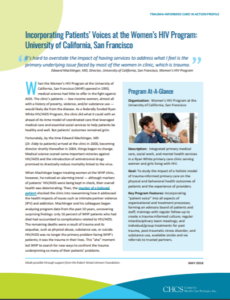
When the Women’s HIV Program at the University of California, San Francisco (UCSF) opened in 1993, medical science had little to offer in the fight against AIDS. The clinic’s patients — low-income women, almost all with a history of poverty, violence, and/or substance use — would likely die from the disease. As a federally funded Ryan White HIV/AIDS Program, the clinic did what it could with an ahead-of-its-time model of coordinated care that leveraged medical care and essential social services to help patients be healthy and well. But patients’ outcomes remained grim.
This profile highlights how the UCSF Women’s HIV Program is employing a holistic model of trauma-informed primary care to improve the physical and behavioral health outcomes of patients as well as the experience of providers.